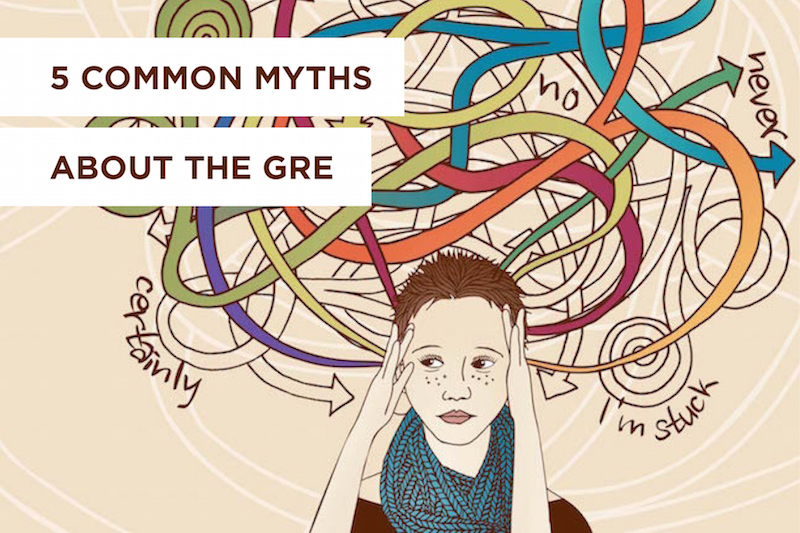The GRE is a big deal; scores on this exam determine the future path of many aspiring graduate students. It’s a complex test, an important test, and sometimes, it’s a misunderstood test. Let’s look at 5 common myths about the GRE.

Myth # 1: The GRE has a single composite score.
There’s a lot of talk about getting a perfect 340 on the GRE, or needing to get at least 300, and so on. In reality, there is no one GRE score on your official score report—there are three. Each section of the GRE has its own score. The GRE Quantitative section is scored on a scale of 130 to 170 points in 1 point increments, as is the GRE Verbal Section. The GRE AWA section is scored on a scale of 0 to 6, in increments of 0.5.
One reason for confusion is that schools may ask for an overall score on the GRE. But if a university requires applicants to have, say, a 300 on the GRE, that means applicants’ combined Quant and Verbal scores need to add up to 300. And there are also plenty of schools that have separate minimum score requirements for each section of the GRE.
Another reason for the confusion is that the GMAT does have a single composite score. This brings us to our next myth.
Myth # 2: The GRE is just like the GMAT.
The GRE and GMAT are similar in some respects, to be sure. But if you’ve already passed the GMAT, don’t assume you’re ready for the GRE. And don’t assume that GMAT prep materials are a perfect fit for GRE study.
If you look carefully at the GMAT vs. GRE decision, you’ll find some important differences. GRE Verbal places a much bigger emphasis on vocabulary than the GMAT Verbal. GRE AWA has two essay questions while GMAT AWA just has one. And you can use a calculator on GRE Quants, but not on the GMAT Quant section. And speaking of calculator use….
Myth # 3: GRE Quantitative is easy. If you know how to use the calculator, you’re home free!
Yes, there is an onscreen calculator function in the GRE Quants section. And yes, you can use your calculator on any GRE math problem. But no, this does not necessarily make GRE Math easy, or less challenging than it would be on the GMAT. In fact, the test-center calculator is a trap of sorts. Most GRE math problems are designed to be solvable without a calculator, and calculator use will often take you extra time, create extra steps, and give you extra chances to make mistakes.
So use your calculator very sparingly on the GRE. Be sure to learn mental math shortcuts that minimize the steps you take to solve a problem, and help you to not depend on your calculator.
Myth # 4: Memorizing the GRE vocabulary ensures a good GRE verbal score.
Just as your calculator won’t guarantee you a top score in Quants, there is no one magic tool to get you a top score in GRE Verbal. Long vocabulary word lists and flashcard drills that help you memorize words and definitions will help you to a point. And to be sure, GRE Verbal is very vocabulary-oriented. But excelling on the GRE takes more than just learning a bunch of new words. The real key is to refine and improve overall reading comprehension. With good reading strategies, you can understand GRE Verbal texts even when you don’t know the meanings of all of the words in them. And that’s the key to truly doing well on GRE Verbal.
Myth # 5: If You are not a “Writing Person,” You Won’t Get a Top AWA Score.
Not everyone loves writing. And that’s OK. You can be uninterested in writing and even have a history of doing poorly on writing assignments, yet still perform well on GRE AWA.
The GRE AWA Essays are a challenge in many ways. You need to write at the deep, analytical level that’s expected of graduate students, and you need to do so under timed testing conditions. However, The essays are also easier than regular academic writing in a number of ways. For one thing, the writing on GRE AWA is shorter and simpler—you’re not writing a master’s thesis, or even a term paper. For another, the format of the essays is predictable—you will answer certain kinds of questions in a certain kind of way.
You can learn and master the GRE AWA question types by test day, even if you don’t always feel confident as a writer. To get started, see the GRE’s official list of Issue AWA Topics and Argument AWA Topics.
















 Back
Back